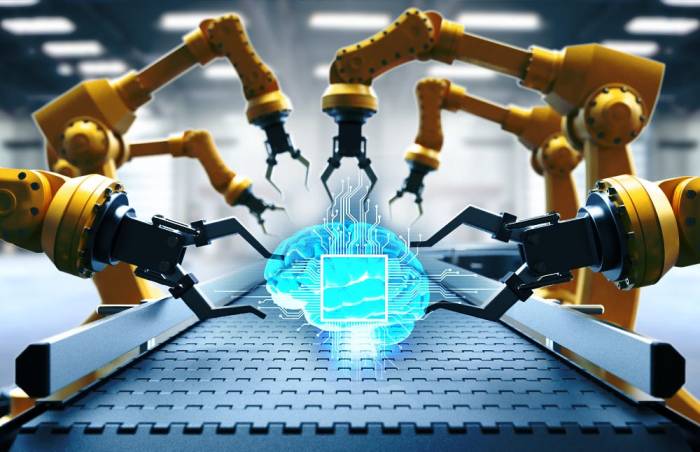AI in manufacturing industry is a game-changer, optimizing processes and transforming the sector with cutting-edge technology. Get ready to dive into the world of artificial intelligence and its impact on manufacturing operations.
Overview of AI in Manufacturing Industry
AI plays a crucial role in optimizing manufacturing processes by using data and algorithms to make intelligent decisions. It revolutionizes the manufacturing sector by improving efficiency, productivity, and quality. Integrating AI into manufacturing operations offers numerous benefits such as predictive maintenance, real-time monitoring, and automated quality control.
Role of AI in Optimizing Manufacturing Processes
AI analyzes large datasets to identify patterns and anomalies, enabling predictive maintenance to prevent machine breakdowns. By optimizing production schedules and resource allocation, AI helps reduce downtime and improve overall efficiency.
Revolutionizing the Manufacturing Sector
AI-enabled robots and cobots work alongside human workers to perform repetitive tasks with precision and speed, leading to increased productivity. With AI-powered quality control systems, defects are detected in real-time, ensuring products meet high standards consistently.
Benefits of Integrating AI into Manufacturing Operations, AI in manufacturing industry
- Enhanced efficiency through predictive maintenance and optimized production schedules.
- Improved product quality with real-time monitoring and automated quality control.
- Cost savings by reducing downtime, minimizing waste, and optimizing resource utilization.
- Increased productivity by automating repetitive tasks and streamlining processes.
Applications of AI in Manufacturing
AI technology has revolutionized the manufacturing industry by enhancing efficiency, productivity, and quality. Let’s dive into some key applications of AI in manufacturing.
Predictive Maintenance in Manufacturing
Predictive maintenance involves using AI algorithms to predict when equipment is likely to fail, allowing manufacturers to schedule maintenance before breakdowns occur. This proactive approach minimizes downtime, reduces maintenance costs, and extends the lifespan of machinery.
Role of AI in Quality Control and Defect Detection
AI plays a crucial role in quality control by analyzing production data in real-time to detect defects or deviations from quality standards. Machine learning algorithms can identify patterns and anomalies, enabling manufacturers to take corrective actions swiftly and maintain high product quality levels.
AI-Powered Robotics in Manufacturing Automation
AI-powered robotics are transforming manufacturing processes by automating repetitive tasks, increasing production speed, and improving accuracy. These robots can adapt to changing conditions, collaborate with human workers, and optimize workflow efficiency. The integration of AI in robotics is revolutionizing the manufacturing landscape, leading to increased productivity and cost savings.
AI Technologies in Manufacturing
Artificial Intelligence (AI) technologies have revolutionized the manufacturing industry, offering advanced solutions to optimize processes, improve product quality, and increase efficiency. In this section, we will delve into the various AI technologies commonly used in manufacturing settings.
Machine Learning vs. Deep Learning Applications
Machine Learning and Deep Learning are both subsets of AI that play crucial roles in manufacturing. While Machine Learning involves algorithms that learn from data and make predictions, Deep Learning utilizes neural networks to mimic the way the human brain functions. Here’s a brief comparison of their applications in manufacturing:
- Machine Learning: Machine Learning algorithms are commonly used for predictive maintenance, demand forecasting, and anomaly detection in manufacturing processes. These algorithms can analyze large datasets to identify patterns and trends, helping manufacturers optimize production schedules and reduce downtime.
- Deep Learning: Deep Learning is particularly effective in image and speech recognition tasks. In manufacturing, Deep Learning is utilized for defect detection in products, quality control, and optimizing supply chain management through advanced pattern recognition.
Computer Vision for Quality Inspection
Computer Vision is a key aspect of AI in manufacturing, enabling automated quality inspection processes. By leveraging computer vision algorithms, manufacturers can detect defects, measure product dimensions, and ensure adherence to quality standards. This technology uses cameras and sensors to capture images of products, which are then analyzed using AI algorithms to identify any deviations from the desired specifications.
Significance of Natural Language Processing (NLP)
Natural Language Processing (NLP) plays a crucial role in streamlining manufacturing operations by enabling machines to understand and interpret human language. In manufacturing settings, NLP can be used for tasks such as inventory management, supply chain optimization, and predictive maintenance. By analyzing text data from various sources, NLP algorithms can extract valuable insights, enhance communication between machines and humans, and automate repetitive tasks, ultimately improving overall operational efficiency.
Challenges and Implementation of AI in Manufacturing

Implementing AI technologies in the manufacturing industry comes with its own set of challenges. One of the key challenges is the initial investment required to adopt AI solutions. Many manufacturing companies may be hesitant to invest in AI due to the high costs involved in acquiring the technology and training employees to use it effectively.
Overcoming Resistance to AI Adoption
- Provide comprehensive training programs for employees to ensure they are comfortable with AI technology and understand its benefits.
- Highlight successful case studies of AI integration in other manufacturing companies to showcase the positive impact it can have on efficiency and productivity.
- Encourage a culture of innovation and continuous improvement within the organization to create a supportive environment for AI implementation.
Successful AI Integration Examples
One example of successful AI integration in the manufacturing industry is General Electric’s use of AI-powered predictive maintenance to reduce downtime and improve equipment reliability.
Another example is Siemens’ implementation of AI algorithms to optimize production processes and minimize waste in their manufacturing operations.
